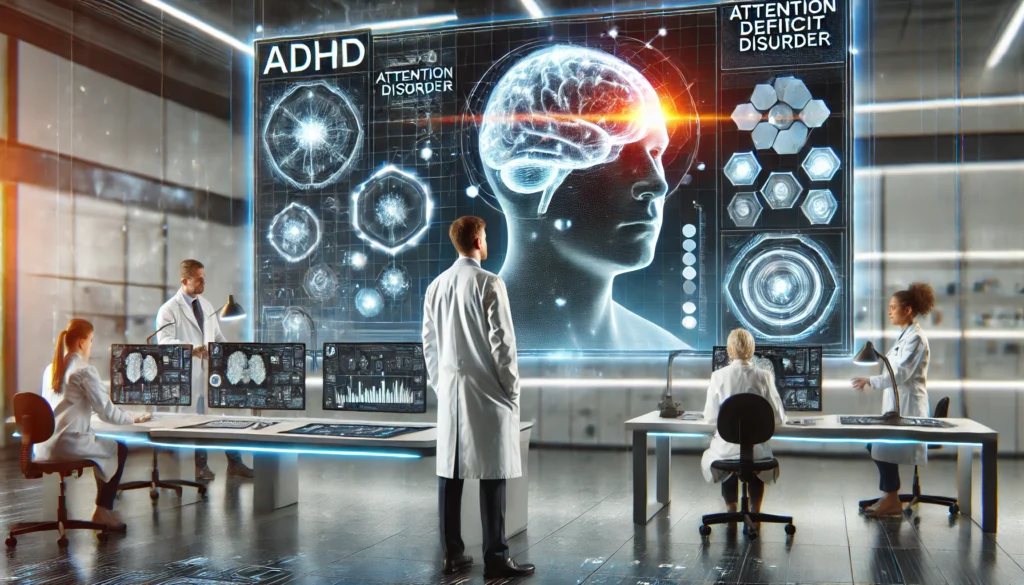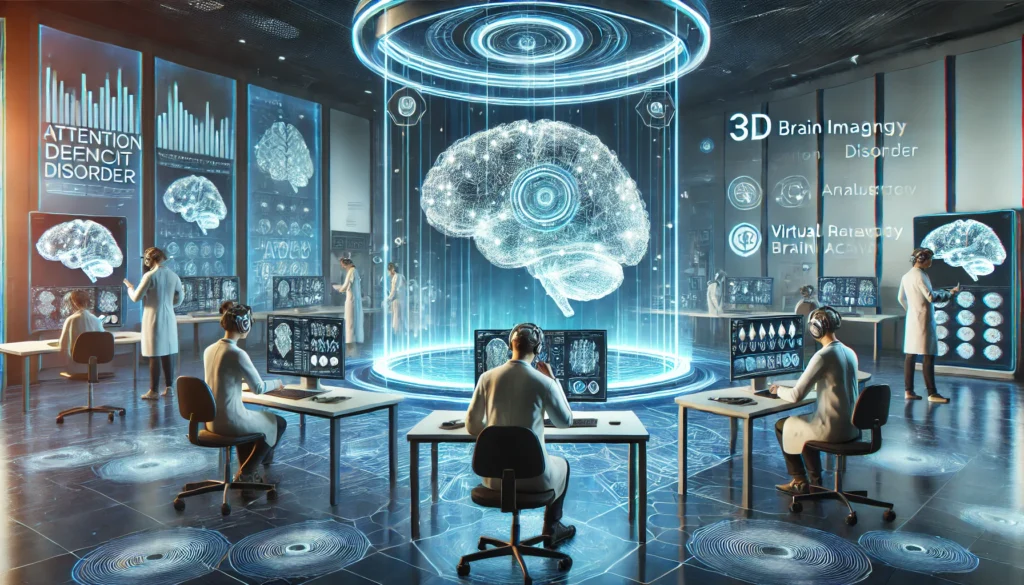Attention Deficit Disorder (ADD), often interchanged with Attention Deficit Hyperactivity Disorder (ADHD), has been the subject of numerous studies and discussions over the years. This neurodevelopmental disorder affects millions globally, and understanding its intricacies is crucial for both treatment and societal acceptance. Recent advances in research have shed light on various aspects of this condition, offering new insights into its causes, manifestations, and potential treatments.
You may also like: Enhancing Concentration: Strategies for ADHD
Understanding ADHD: Beyond Behavioral Disorder
ADHD is often perceived as merely a behavioral issue, but recent studies suggest a more intricate interplay of factors that contribute to its development. Understanding these complexities is pivotal for effective treatment strategies.
Historical Context
Early Perceptions and Misconceptions
Historically, ADHD was primarily viewed as a behavioral disorder, with symptoms such as inattention, hyperactivity, and impulsivity being the main focus. Initially identified in the early 20th century, ADHD has been a controversial topic, often misunderstood by both the medical community and the public. Early treatments were rudimentary, relying heavily on behavioral interventions and medications like stimulants. Misconceptions about ADHD led to stigmatization, which affected the quality of life for those diagnosed.
Evolution of Diagnostic Criteria
Over the years, the diagnostic criteria for ADHD have evolved significantly. The introduction of standardized diagnostic manuals, such as the DSM (Diagnostic and Statistical Manual of Mental Disorders), has provided clearer guidelines. This evolution reflects a broader understanding of the disorder, recognizing its diverse manifestations. Early diagnostic approaches were limited, often failing to capture the full scope of symptoms, leading to underdiagnosis or misdiagnosis.
Influence of Societal Attitudes
Societal attitudes towards ADHD have also shifted, influenced by advocacy and increased awareness. In the past, ADHD was often dismissed as a lack of discipline or poor parenting. However, ongoing education and advocacy efforts have highlighted the biological and neurological underpinnings of the disorder. This shift has fostered a more supportive environment for individuals with ADHD, encouraging early diagnosis and intervention.
Current Perspective
Complex Interplay of Factors
Recent research has expanded our understanding of ADHD, suggesting that it is not merely a behavioral disorder but a complex interplay of genetic, neurological, and environmental factors. Studies focusing on brain imaging have revealed differences in brain structure and function in individuals with ADHD, particularly in areas related to attention and impulse control. This multifaceted perspective underscores the need for comprehensive treatment approaches that address various contributing factors.
Brain Imaging and ADHD
Advancements in neuroimaging technologies have been instrumental in exploring the neurological basis of ADHD. Functional MRI (fMRI) and other imaging techniques have provided insights into the brain regions affected by ADHD. These studies have revealed structural and functional abnormalities, particularly in the prefrontal cortex and other areas associated with executive functions. Understanding these neurological differences is crucial for developing targeted therapeutic interventions.
The Role of Environmental Influences
In addition to genetic and neurological factors, environmental influences play a significant role in ADHD. Research has shown that prenatal and early life experiences can impact the development of ADHD. Factors such as maternal health, nutrition, and exposure to toxins during pregnancy can contribute to the risk. Recognizing the importance of these environmental factors can inform prevention strategies and early interventions to mitigate the risk of ADHD.

Genetic Factors in ADHD
The genetic underpinnings of ADHD are a focal point of current research, offering insights into the hereditary nature of the disorder and potential implications for treatment.
Heritability and Genetic Studies
Genetic Architecture of ADHD
ADHD is highly heritable, with studies indicating that genetics account for a significant portion of the risk. Recent advances in genome-wide association studies (GWAS) have identified several genetic variants associated with ADHD, providing a clearer picture of its genetic architecture. These findings suggest that ADHD shares genetic roots with other psychiatric disorders, such as depression and anxiety, highlighting the complexity of its genetic basis. Understanding the genetic architecture is crucial for unraveling the biological pathways involved in ADHD.
Shared Genetic Risk with Other Disorders
Research has revealed that ADHD shares genetic risk factors with various other psychiatric conditions. This overlap suggests that common biological mechanisms may underlie these disorders, contributing to their co-occurrence. Identifying shared genetic markers can enhance our understanding of the broader spectrum of psychiatric disorders and inform cross-disorder therapeutic strategies.
Genetic and Environmental Interactions
The interaction between genetic predispositions and environmental factors is a key area of research in ADHD. While genetic factors contribute significantly to the risk of ADHD, environmental influences can modulate the expression of genetic predispositions. Understanding these interactions can inform personalized intervention strategies that consider both genetic and environmental factors.
Implications for Treatment
Personalized Medicine and ADHD
Understanding the genetic factors of ADHD opens new avenues for personalized medicine. By identifying specific genetic markers, researchers are hopeful that future treatments can be tailored to an individual’s genetic profile, enhancing efficacy and reducing side effects. Personalized medicine aims to move away from the one-size-fits-all approach, offering customized treatment plans that consider an individual’s unique genetic makeup.
Targeting Genetic Pathways
Advancements in genetic research have identified potential therapeutic targets for ADHD. By understanding the biological pathways affected by genetic variations, researchers can develop targeted interventions. These interventions may include medications that modulate specific neurotransmitter systems or gene therapies that address underlying genetic abnormalities.
Ethical Considerations in Genetic Research
As genetic research in ADHD advances, ethical considerations become increasingly important. Issues such as genetic privacy, consent, and the potential for genetic discrimination must be carefully addressed. Ensuring that research benefits are accessible and equitable is crucial for the responsible application of genetic findings in clinical practice.
Neurological Insights: The Brain and ADHD
The neurological underpinnings of ADHD provide critical insights into its pathophysiology and inform the development of targeted interventions.
Neuroimaging Breakthroughs
Real-Time Brain Activity Observation
Advancements in neuroimaging have been pivotal in ADHD research. Techniques such as functional MRI (fMRI) and positron emission tomography (PET) scans have allowed scientists to observe brain activity and structure in real-time. These studies have shown that individuals with ADHD often exhibit reduced activity in the prefrontal cortex, a region crucial for attention, decision-making, and impulse control. Real-time observation of brain activity provides valuable insights into the functional abnormalities associated with ADHD.
Structural Brain Differences
In addition to functional abnormalities, structural differences in the brains of individuals with ADHD have been identified. Research has shown variations in brain volume and connectivity in specific regions, such as the prefrontal cortex and basal ganglia. Understanding these structural differences is essential for developing interventions that target the underlying neurological deficits in ADHD.
Longitudinal Neuroimaging Studies
Longitudinal studies using neuroimaging techniques have provided insights into the developmental trajectory of ADHD. These studies track changes in brain structure and function over time, offering a dynamic view of how ADHD evolves. Longitudinal research is crucial for identifying critical periods for intervention and understanding the long-term effects of ADHD on brain development.
Neurotransmitter Dynamics
Dopamine and ADHD
Research has also focused on the role of neurotransmitters, the brain’s chemical messengers, in ADHD. Dopamine, in particular, has been a focal point, with studies suggesting that dopamine dysregulation may contribute to the symptoms of ADHD. This has implications for the development of new medications that target these neurotransmitter systems more precisely. Understanding dopamine’s role in ADHD can inform the development of treatments that modulate dopamine levels to alleviate symptoms.
Other Neurotransmitter Systems
In addition to dopamine, other neurotransmitter systems, such as norepinephrine and serotonin, have been implicated in ADHD. Research has shown that imbalances in these neurotransmitter systems may contribute to the cognitive and behavioral symptoms of ADHD. Targeting multiple neurotransmitter systems may enhance the effectiveness of pharmacological treatments for ADHD.
Pharmacological Implications
The insights gained from studying neurotransmitter dynamics have significant implications for pharmacological treatments. By understanding the specific neurotransmitter imbalances associated with ADHD, researchers can develop medications that target these imbalances more effectively. This approach aims to improve treatment outcomes while minimizing side effects.

Environmental Influences on ADHD
Environmental factors play a crucial role in the development and management of ADHD, offering opportunities for prevention and intervention.
Early Life Factors
Prenatal Influences on ADHD Risk
While genetics play a significant role in ADHD, environmental factors are also crucial. Recent research highlights the impact of prenatal and early life exposures, such as maternal smoking, alcohol use, and stress during pregnancy, on the development of ADHD. These findings underscore the importance of early intervention and prevention strategies. Prenatal care and lifestyle modifications during pregnancy can reduce the risk of ADHD.
Postnatal Environmental Factors
Postnatal environmental factors, such as early childhood experiences and parenting styles, can also influence ADHD risk. Research has shown that factors like exposure to toxins, diet, and physical activity levels can impact ADHD symptoms. Understanding these influences can inform interventions that promote healthy development and reduce ADHD risk.
Socioeconomic and Cultural Influences
Socioeconomic status and cultural factors can also impact the prevalence and expression of ADHD. Access to healthcare, education, and social support can influence the diagnosis and management of ADHD. Recognizing the role of socioeconomic and cultural factors is crucial for developing equitable interventions that address disparities in ADHD care.
Lifestyle and ADHD
Dietary Influences on ADHD Symptoms
Lifestyle factors, including diet, physical activity, and sleep, have been shown to influence ADHD symptoms. Studies suggest that a balanced diet rich in omega-3 fatty acids, regular physical exercise, and adequate sleep can mitigate some ADHD symptoms, offering a holistic approach to management. Dietary interventions may include reducing sugar intake, increasing fruit and vegetable consumption, and considering nutritional supplements.
The Role of Physical Activity
Physical activity has been shown to have positive effects on ADHD symptoms. Regular exercise can improve attention, reduce hyperactivity, and enhance mood. Encouraging physical activity as part of a comprehensive ADHD management plan can improve overall well-being and quality of life.
Sleep and ADHD
Sleep disturbances are common in individuals with ADHD, and addressing sleep issues can significantly improve symptoms. Establishing consistent sleep routines and creating a conducive sleep environment can enhance sleep quality. Understanding the relationship between sleep and ADHD is crucial for developing interventions that address sleep-related challenges.
Innovative Treatment Approaches
The development of innovative treatment approaches offers hope for more effective and personalized management of ADHD.
Pharmacological Advances
Non-Stimulant Medications
Recent advances in pharmacology have led to the development of new medications with improved safety profiles and efficacy. Non-stimulant medications, for example, have emerged as viable alternatives for individuals who do not respond well to traditional stimulant treatments. These medications offer a different mechanism of action, targeting neurotransmitter systems beyond dopamine.
Combination Therapies
Combination therapies that include both pharmacological and non-pharmacological interventions are gaining traction. By addressing multiple aspects of ADHD, combination therapies can enhance treatment outcomes. This approach may involve using medications alongside behavioral therapies, dietary interventions, or lifestyle modifications.
Future Directions in Pharmacological Research
Ongoing research is focused on developing novel pharmacological treatments for ADHD. This includes exploring new drug targets, optimizing existing medications, and minimizing side effects. Future pharmacological advancements hold the potential to improve treatment efficacy and enhance the quality of life for individuals with ADHD.
Behavioral and Cognitive Therapies
Cognitive Behavioral Therapy (CBT)
Beyond medication, behavioral therapies remain a cornerstone of ADHD treatment. Cognitive Behavioral Therapy (CBT) has been shown to be effective in helping individuals develop coping strategies and improve executive function skills. CBT focuses on changing negative thought patterns and behaviors, providing tools for managing symptoms effectively.
Digital Therapeutics and ADHD
Moreover, digital therapeutics, including smartphone apps and online platforms, are gaining traction as accessible tools for ADHD management. These tools offer personalized interventions, real-time feedback, and support for individuals with ADHD. Digital therapeutics can complement traditional therapies, providing additional resources for symptom management.
Mindfulness and ADHD
Mindfulness-based interventions have shown promise in managing ADHD symptoms. Mindfulness practices can enhance attention, reduce stress, and improve emotional regulation. Incorporating mindfulness into ADHD treatment plans can provide individuals with additional strategies for managing their symptoms.

Future Directions in ADHD Research
The future of ADHD research holds promise for more effective and personalized treatment approaches, informed by a deeper understanding of the disorder’s complexities.
Personalized Medicine
Integrating Genetic, Neurological, and Environmental Data
As our understanding of ADHD grows, so does the potential for personalized medicine. Future research is likely to focus on integrating genetic, neurological, and environmental data to develop individualized treatment plans that cater to the unique needs of each patient. Personalized medicine aims to optimize treatment outcomes by considering an individual’s unique biological and environmental context.
Advancements in Biomarker Research
The identification of biomarkers for ADHD can enhance the precision of diagnosis and treatment. Biomarkers can provide objective measures of ADHD, facilitating early detection and monitoring of treatment progress. Ongoing research is focused on identifying reliable biomarkers that reflect the underlying pathophysiology of ADHD.
Challenges and Opportunities
While personalized medicine offers significant promise, it also presents challenges. These include the need for robust data integration, ethical considerations, and ensuring accessibility to personalized interventions. Addressing these challenges is crucial for realizing the full potential of personalized medicine in ADHD care.
Ethical Considerations
Genetic Testing and Privacy Concerns
With these advancements come ethical considerations, particularly concerning genetic testing and data privacy. It is crucial for the scientific community to address these issues to ensure that research benefits are accessible and equitable. Safeguarding genetic data and ensuring informed consent are essential for maintaining public trust in ADHD research.
Equity in Access to Treatments
Ensuring equitable access to ADHD treatments is a key ethical consideration. Disparities in healthcare access can impact the availability and effectiveness of treatments for individuals with ADHD. Addressing these disparities is crucial for promoting health equity and ensuring that all individuals with ADHD receive appropriate care.
Balancing Innovation and Ethical Responsibility
As ADHD research advances, it is essential to balance innovation with ethical responsibility. This includes considering the implications of new treatments, ensuring informed consent, and addressing potential risks. Ethical considerations should guide research and clinical practice to ensure that advancements benefit individuals with ADHD and society as a whole.
Conclusion
The landscape of ADHD research is evolving rapidly, driven by technological advancements and a deeper understanding of the disorder’s multifaceted nature. While challenges remain, the progress in genetic, neurological, and environmental research provides hope for more effective and personalized treatments in the future. For health and wellness coaches, science journalists, and biohackers alike, staying informed about these developments is essential to offering accurate and practical advice.
By embracing the complexity of ADHD and leveraging the latest scientific insights, we can move towards a future where individuals with ADHD receive the understanding and support they need to thrive. This future promises improved quality of life, reduced stigma, and enhanced opportunities for individuals with ADHD to reach their full potential.
Further Reading:
Attention Deficit Hyperactivity Disorder
Attention-Deficit / Hyperactivity Disorder (ADHD) in Children
Important Note: The information contained in this article is for general informational purposes only, and should not be construed as health or medical advice, nor is it intended to diagnose, prevent, treat, or cure any disease or health condition. Before embarking on any diet, fitness regimen, or program of nutritional supplementation, it is advisable to consult your healthcare professional in order to determine its safety and probable efficacy in terms of your individual state of health.
Regarding Nutritional Supplements Or Other Non-Prescription Health Products: If any nutritional supplements or other non-prescription health products are mentioned in the foregoing article, any claims or statements made about them have not been evaluated by the U.S. Food and Drug Administration, and such nutritional supplements or other health products are not intended to diagnose, treat, cure, or prevent any disease.


